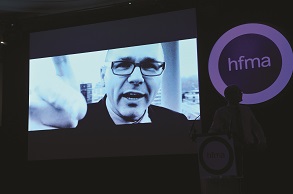Leaning into the future
Most of us are now firmly focused on ‘the business end’ of the year. That means doing all we can to deliver what we said we would do this financial year, while laying down tracks to ensure safe passage into the next.
My personal version of this reality is a quarter two run-rate that requires significant corrective action to ensure Poole Hospital stays on course during the remaining six months of 2017/18.
At the same time, we have to reaffirm assumptions for year two of the Dorset collaborative agreement and work up the detail of a clinical services review that has already confirmed a significant acute care reconfiguration over the next five years. 
All of this is equally important, but it is only by delivering on today that we will retain the autonomy to continue to plan for tomorrow. You will all have your own local versions of this.
At times the demands can feel relentless for even the most experienced finance professional and call upon levels of deep personal resilience. Our network has always provided a safe space to share and learn, however challenging things may look.
We must build on this and continue to support each other both now and into the future.
Local challenges of course are framed by the broader national challenge and the financial envelope we work within. November should give us some insight into how we are meeting that challenge as a whole service. First, we will see the publication of the quarter two NHS provider results in England. It will be helpful if the sector – in aggregate with commissioners – remains able to deliver financial balance again in this year, as we achieved in 2016/17.
Then, later in the month, the chancellor’s Budget should provide some clarity around the parameters for future planning.
Despite the medium-term economic uncertainty created by Brexit, there is a clear expectation that the 1% pay cap for NHS staff will be lifted from 2018/19.
If this is followed through, the detail of how it would be funded – and any other potential investment – will provide essential reading for the whole finance community.
However, we should all be encouraged that despite the significant pressure on the NHS, a report from the King’s Fund and Ipsos MORI recently confirmed that public support for the NHS has remained consistent over the last two decades.
Some 77% believe that the NHS should be maintained in its current form, with two thirds of adults willing to pay more tax to fund it.
I would also like to use my column this month to thank Bob Alexander on behalf of the association. The deputy chief executive and executive director of resources at NHS Improvement confirmed last month that he will be taking up a new role in the new year, leading the Sussex and East Surrey Sustainability and Transformation Partnership.
Bob has made an enormous contribution to finance professional development over many years. He has always made time to speak at our branch events, as well as at the national HFMA conference. He has supported the annual HFMA awards judging panel and was instrumental in ensuring Future-Focused Finance got the support and direction needed from the very outset.
On a personal level, Bob has been there for me when I needed his wise counsel, reflection and advice, and for that I will always be grateful.
We can be sure that Bob will continue to be an advocate for strong financial management and the importance of our function to the quality and sustainability of the NHS.
Contact the president on [email protected]
Related content
We are excited to bring you a fun packed Eastern Branch Conference in 2025 over three days.
This event is for those that will benefit from an overview of costing in the NHS or those new to costing and will cover why we cost and the processes.